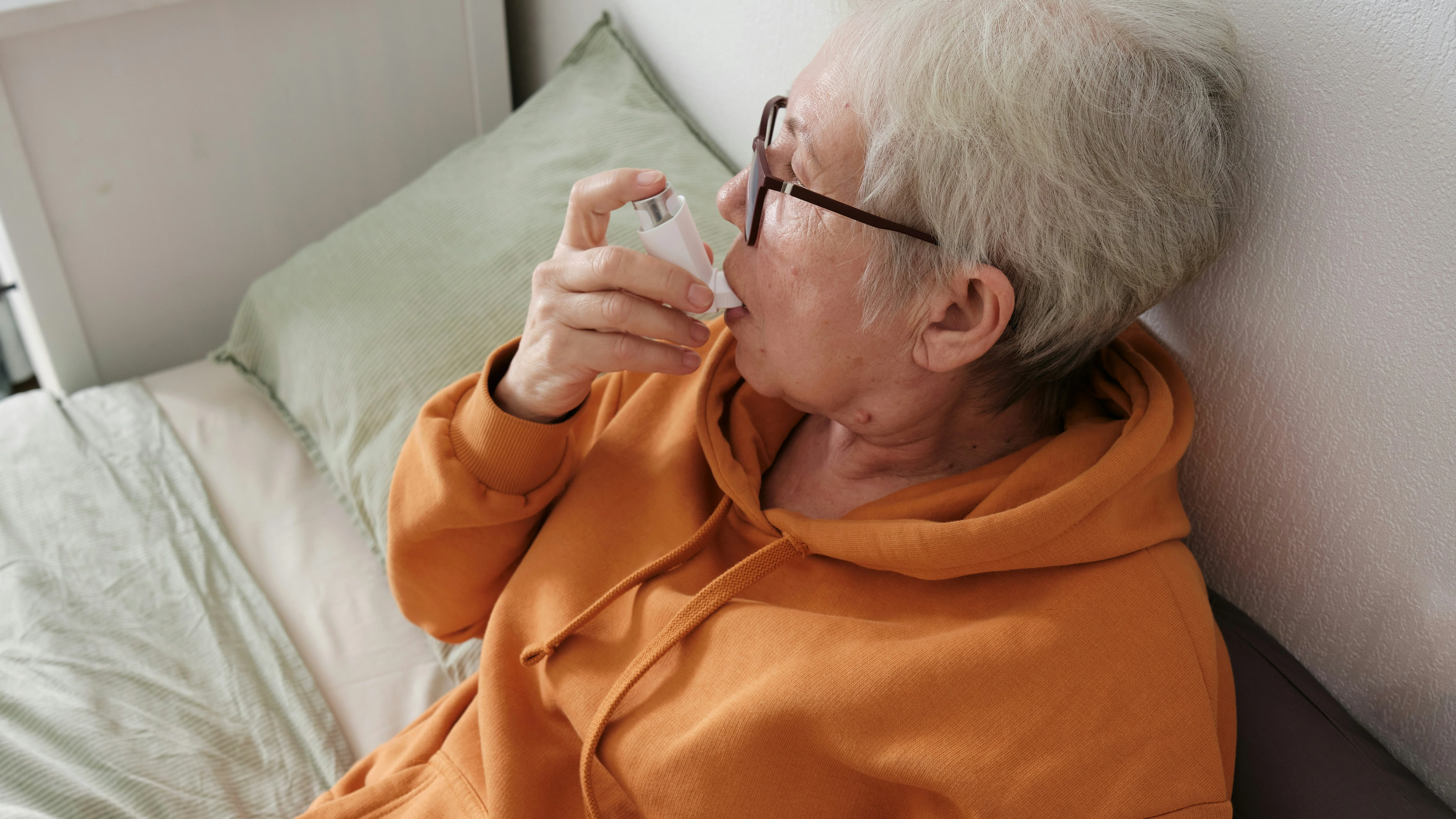
Struggling to catch your breath can be frightening, especially when you're not sure what's causing it. Whether an asthma vs anxiety attack, both can leave you gasping for air, making your chest feel tight, and filling you with panic. Understanding the difference between these two conditions is crucial for getting the right treatment quickly.
Related: Cystitis vs UTI Explained: Are They the Same Thing?
Why Asthma vs. Anxiety Attacks: Why They’re Often Confused
.webp)
The overlap between asthma vs. anxiety attacks can make them remarkably difficult to tell apart, even for those who've experienced both. Here's why so many people struggle to identify which condition they're facing.
Both Cause Breathing Difficulties
The most obvious similarity is that both conditions make it harder to breathe. Whether it's asthma narrowing your airways or anxiety causing you to hyperventilate, the end result feels alarmingly similar.
You might find yourself taking rapid, shallow breaths or feeling like you can't get enough air into your lungs. This shared symptom is often the primary reason people mistake one condition for the other.
Similar Physical Sensations of Chest Tightness
That uncomfortable feeling of pressure or constriction in your chest happens with both asthma and anxiety attacks. In asthma, this tightness comes from inflammation and narrowing of the airways.
With anxiety, it's often caused by muscle tension and hyperventilation. Your body doesn't always signal which mechanism is at work, leaving you guessing about the underlying cause.
They Can Trigger Each Other
Here's where things get particularly complicated: asthma can trigger anxiety, and anxiety can worsen asthma symptoms.
If you're experiencing an asthma attack, the fear and stress of not being able to breathe properly can spark an anxiety response. Conversely, if you have asthma and experience anxiety, the physical stress on your body can actually trigger asthma symptoms.
This interconnection creates a challenging cycle that makes diagnosis even more difficult.
Key Differences Between Asthma and Anxiety Attacks
Despite their similarities, asthma and anxiety attacks have distinct characteristics that can help you identify what you're dealing with.
Timing and Trigger Patterns
Asthma attacks typically have clear environmental or physical triggers. You might notice symptoms appearing after exercise, exposure to cold air, coming into contact with allergens like pollen or pet dander, or being around smoke or strong odours. These triggers tend to be consistent and predictable.
Anxiety attacks, on the other hand, often occur in response to stress, worry, or sometimes without any obvious trigger at all. They can happen during calm moments or in situations that make you feel emotionally overwhelmed. The timing is usually less predictable and more closely tied to your mental and emotional state than to your physical environment.
Sound of Your Breathing
Listen carefully to the sounds you're making when you breathe. Asthma typically produces a distinctive whistling or wheezing sound, particularly when you exhale. This happens because air is being forced through narrowed airways.
With anxiety attacks, your breathing is usually rapid but quiet. You might be taking quick, shallow breaths at the top of your chest, but you're unlikely to hear wheezing sounds. According to the NHS, wheezing is one of the hallmark signs of asthma rather than anxiety.
Response to Treatment
This is perhaps the most telling difference. If you use an asthma reliever inhaler and your symptoms improve within minutes, you're almost certainly dealing with asthma. These medications work by relaxing the muscles around your airways, allowing them to open up.
Anxiety attacks don't respond to asthma medication. Instead, they typically improve with calming techniques like slow breathing exercises, grounding methods, or simply giving yourself time for the anxiety to pass naturally.
Specific Symptoms That Point to Asthma

Certain symptoms are strong indicators that what you're experiencing is asthma rather than anxiety.
Wheezing When You Breathe Out
That high-pitched whistling sound when you exhale is classic asthma. The wheeze might be subtle or quite loud, but its presence is a strong signal that your airways are constricted. You might also feel this as a rattling sensation in your chest. This symptom rarely occurs with pure anxiety attacks.
Coughing That Worsens at Night
If you find yourself waking up in the early hours with a persistent cough, asthma is a likely culprit. Asthma symptoms often intensify at night or in the early morning hours due to natural changes in your body's hormone levels and airway function. This nocturnal pattern is particularly common with asthma and less typical of anxiety.
Symptoms Triggered by Physical Activity or Cold Air
Does running for the bus leave you wheezing? Do you struggle to breathe when you step outside on a cold winter morning? These are telltale signs of asthma. Exercise-induced asthma is incredibly common, and cold air is a well-known asthma trigger because it can cause airways to narrow. Anxiety attacks can happen during exercise, but they're not reliably triggered by it.
Specific Symptoms That Point to an Anxiety Attack
Anxiety attacks come with their own distinctive features that set them apart from asthma.
Rapid Heart Rate and Palpitations
While your heart might race a bit with asthma due to stress or medication, anxiety attacks typically cause a much more pronounced and noticeable increase in heart rate. You might feel like your heart is pounding out of your chest, skipping beats, or racing uncontrollably. This cardiovascular response is a primary feature of anxiety rather than asthma.
Feelings of Dread or Impending Doom
One of the most distinctive features of an anxiety attack is an overwhelming sense that something terrible is about to happen. You might feel an inexplicable fear, worry that you're dying, or experience intense feelings of panic that seem disproportionate to the situation.
These psychological symptoms are central to anxiety attacks but aren't typical features of asthma attacks, though asthma can certainly cause worry about breathing.
Tingling or Numbness in Extremities
If your fingers, toes, or the area around your mouth start to feel tingly or numb during an episode, this points strongly toward anxiety. This sensation is caused by hyperventilation, which changes the balance of oxygen and carbon dioxide in your blood.
According to Mind, these tingling sensations are common during panic attacks but don't occur with asthma.
What to Do If You're Unsure Which One You're Experiencing
When you're in the middle of an episode and can't identify whether it's asthma or anxiety, here's what you should do.
Try Your Reliever Inhaler First If You Have One
If you have asthma and carry a reliever inhaler like Ventolin, use it. If your symptoms are due to asthma, you should notice improvement within a few minutes. If there's no change after 10 to 15 minutes, what you're experiencing is more likely to be anxiety or another condition. This practical test can provide valuable information about what's happening in your body.
Focus on Slow, Controlled Breathing
Regardless of whether you're having an asthma or anxiety attack, slowing your breathing can help. Try breathing in through your nose for four counts, holding for a moment, then breathing out slowly through your mouth for six counts.
This technique can help calm anxiety and may also ease mild asthma symptoms by preventing hyperventilation and reducing panic.
Seek Immediate Medical Attention for Severe Symptoms
Don't take chances with your health. Call 999 or go to A&E immediately if you experience severe difficulty breathing, your lips or fingernails turn blue, you're unable to speak in full sentences, your reliever inhaler isn't helping, or you feel confused or drowsy.
These symptoms indicate a medical emergency that requires professional intervention, regardless of the underlying cause.
Understanding the asthma vs. anxiety attacks empowers you to respond appropriately when symptoms strike. If you suspect you have asthma but haven't been diagnosed, speak with your GP about getting proper testing and treatment.
If you're looking for convenient access to asthma medication after receiving a diagnosis, we offer a straightforward online service that puts your respiratory health first. Our competitive pricing and easy-to-use platform make managing your asthma simple and stress-free. For those managing anxiety, we also provide support through our online assessment and dispensing service. Get started today!


